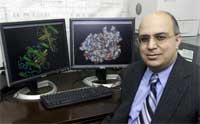
South Kingstown resident doing nationally recognized HIV, cancer studies
KINGSTON, R.I. – January 23, 2008 – A University of Rhode Island pharmacy professor is developing compounds that could play a major role in the fight against certain cancers, discovering novel compounds to fight the virus that causes AIDS and finalizing development of a cream that could be used by women during intercourse to prevent Human Immunodeficiency Virus (HIV) transmission.
Keykavous Parang, an associate professor of biomedical and pharmaceutical sciences in the College of Pharmacy, has been awarded more than $1.2 million during the last year for his promising cell- and chemistry-based research on two of the world’s major killers—cancer and HIV, the virus that causes AIDS.
The American Cancer Society has awarded Parang a four-year, $627,000 grant to continue his studies on Src, a cell protein linked closely to the development of breast, colon, lung, ovarian, gastric and pancreatic cancers.
“Considerable evidence implicates elevated expression and/or activity of Src in cancer development,” Parang said. “In 80 percent of women with breast cancer, there is an over-expression of Src.”
With more than 500 protein kinases in the human body, Parang is focusing his attention on Src protein kinase. This enzyme is involved in regulation of different cellular processes and signaling pathways. In cancer, cell regulation breaks down and cells grow uncontrollably.
“The American Cancer Society wants my research team to develop new inhibitors that act on Src exclusively,” Parang said. “The goal is to develop an inhibitor that simultaneously targets two binding pockets of the enzyme in the cancer cells, so that the inhibitor is more potent and more selective. We expect to identify compounds that exhibit significantly greater affinities and selectivity than conventional inhibitors that target only one binding pocket of the enzyme.”
Parang already discovered several potent compounds against the enzyme, but now he is working to make them more effective in cells. “I want to make them more drug-like, so pharmaceutical companies will take an interest. The compounds are optimized by further structure modifications, such as reducing size, to improve their cellular uptake in cancer cells. A drug company will hopefully then further optimize the compound for drug development.”
$300,000 National Science Foundation grant
The National Science Foundation has given preliminary approval to a three-year, $300,000 grant to synthesize organophosphorus compounds, some of which could lead to anti-viral medicines effective against HIV.
Parang said several organophosphorus are important precursors for producing biological activities of several anti-viral and anti-cancer drugs.
Patients with AIDS must now take extensive drug cocktails continuously for the rest of their lives. Several of these drugs are intrinsically inactive and become active in the cells after conversion to organophosphorus compounds. If patients stop taking them, disease and symptoms return by proliferation of resistant HIV-infected cells.
“We are working on compounds that would go into HIV-infected cells, release two or three active anti-HIV agents, and block replication,” Parang said. “The compounds would enter the nucleic acid of the cell, prevent replication and then lead to the death of the virus. The compounds are expected to be more potent, less toxic and more effective in killing resistant viruses than current available drugs.”
Parang said most of the strategies for synthesis of organophosphorus compounds have been hampered by the absence of selectivity and low overall yields. He added that pure compounds cannot be prepared in sufficient quantities and the current methods cannot be generalized for synthesis of diverse and large numbers of compounds.
“We have already developed methods for synthesis that have been published in 11 papers,” Parang said. “We can make hundreds of compounds, but now we want to focus our research to develop more novel compounds that cannot be created by conventional methods. We are already testing several organophosphorus compounds against HIV.”

Gongqin Sun, an associate professor in the Department of Cell and Molecular Biology, is the co-principal investigator for both grants. The two researchers have collaborated during the last seven years, which has resulted in four, multi-year grants from the American Cancer Society, the National Science Foundation and the National Institutes of Health.
$288,000 from the Contraceptive Research and Development Program
in Collaboration with Eastern Virginia Medical School’s Clinical Research Center
Supported by two-year funds from the contraceptive research program, Parang and his team are developing a topical cream that could be used by woman during intercourse to stop the spread of HIV. Parang said the need is great with 42 million people living with HIV/AIDS today.
“Women face a greater risk of acquiring HIV and are 4 to 17 times more likely to contract HIV because of economic, social and biological factors,” Parang said. “So there is an urgent need to develop a safe over-the-counter intravaginal/intrarectal microbicide for prevention of HIV transmission in women.”
He said the goal of the project is to develop anti-HIV-1 microbicides with or without spermicidal activity by combining agents having different mechanisms of action. Some of these microbicides are in pre-clinical studies, Parang said. In addition to this two-year project, Parang has already received $274,000 through the same program since 2003.
“I get excited by doing work in these areas because they are new interdisciplinary strategies to fight killer diseases,” Parang said. “I am looking at research that is original and creative. I have always been open to the big picture and not a narrow field, so I work with many biologists. We are advancing chemistry by solving biological problems.”
Media Contact: Dave Lavallee, 401-874-5862
URI Department of Communications & Marketing photos by Michael Salerno Photography.

